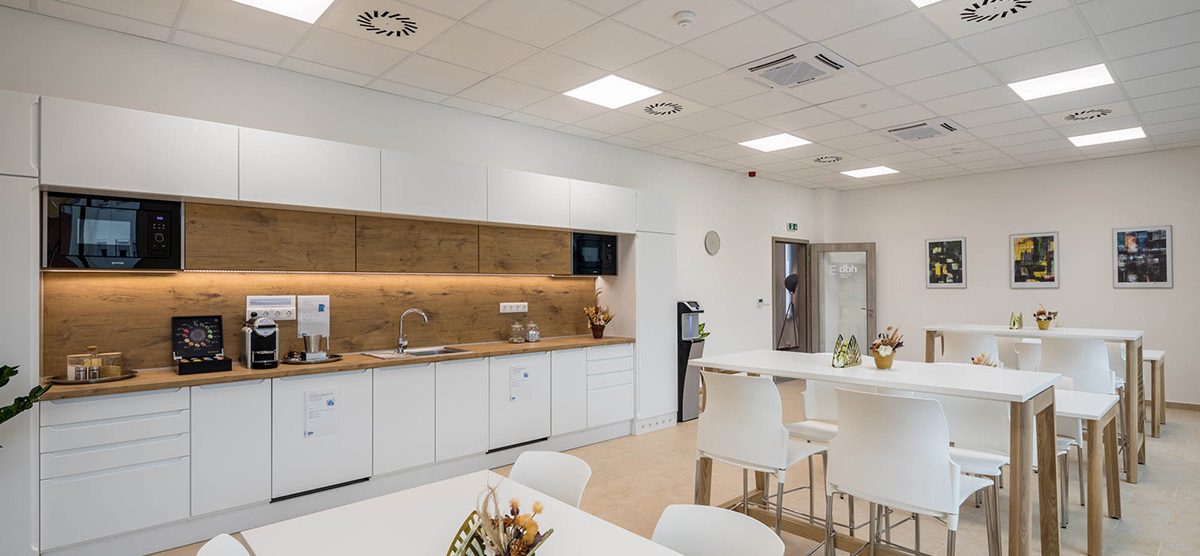The Role of Office Cafeterias in Employee Well-Being
Office cafeterias are increasingly becoming more than just places to grab a quick bite. They play an essential role in shaping workplace wellness, boosting employee productivity, and fostering a sense of community. For HR leaders, office managers, and business owners, investing in workplace nutrition isn’t just a “nice-to-have” anymore – it’s a strategic decision that can yield measurable benefits for employee health and overall business performance.
This article explores the crucial connection between food, productivity, and health, trends in office catering and cafeterias, the benefits of healthy workplace food options, and real-world examples of companies that made workplace nutrition a priority.
How Food Impacts Productivity and Health
What employees eat during their workday has a significant impact on how they perform and feel. Nutrition isn’t just about energy; it affects focus, mood, and long-term health outcomes.
The Link Between Nutrition and Energy Levels
Food fuels the body. Nutrient-rich meals help sustain consistent energy levels throughout the day, preventing the afternoon “slump” that comes from consuming too many quick sugars and refined carbs. Poor diet choices, like fast food or sugary snacks, may cause energy spikes followed by productivity-diminishing crashes.
For instance, providing complex carbohydrates such as whole grains in office cafeterias can aid in steady energy release. Including protein-rich foods like eggs, legumes, or lean meats can further support sustained focus and cognitive function.
Impacts on Cognitive Performance and Mood
Research shows that certain foods, like leafy greens, fatty fish, and nuts, contribute to brain function and improve memory and concentration. Conversely, diets high in trans fats or processed foods are linked to reduced cognitive performance and lethargy.
Providing access to healthy meals can also promote better moods. Foods rich in vitamins such as B6 or magnesium can help employees manage stress and maintain a positive mental outlook. This ties directly to improved collaboration and workplace satisfaction.
Long-Term Health Benefits
The presence of nutritious food in the office encourages better eating habits that extend beyond the workplace. Long-term gains for your team include reduced rates of chronic conditions such as obesity, diabetes, and heart disease. This means fewer sick days and improved health for your workforce, ensuring both employees and the organization benefit.
The Benefits of Healthy Food Options at Work
Making nutritious food available is no longer just an employee perk – it’s a business advantage. Here’s why investing in healthy food options boosts workplace wellness and overall success:
Enhanced Productivity
Providing healthy meals improves energy levels and enhances focus, powering employees to perform their tasks effectively. New Zealand’s Ministry for Primary Industries discovered that well-designed workplace food programs led to a productivity increase of up to 20%.
Improved Employee Retention and Morale
According to surveys, employees report greater satisfaction with their workplace when employers cater to their health and wellness needs. Offering healthy food options communicates that the company values its team, fostering loyalty and boosting morale.
Reduced Health Costs
Healthier employees mean lower medical costs for organizations. A survey from the International Foundation of Employee Benefits Plans found that companies promoting wellness initiatives, like nutrition programs, saw reduced healthcare expenses by 25-30%.
Strengthened Cross-Team Collaboration
Shared meal opportunities in office cafeterias help build stronger employee relationships. Eating together fosters informal networking and collaboration, strengthening team cohesion and organizational culture.
Steps to Elevate Office Food Choices
Considering the evidence and examples above, HR managers and office leaders can take actionable steps to begin improving their workplace cafeterias:
- Conduct Employee Surveys: Find out what employees want by surveying their food preferences, dietary restrictions, and overall feedback on current offerings.
- Partner with Nutrition-Focused Caterers: Look for catering services with a track record of providing balanced, delicious meals.
- Educate Your Workforce: Include nutritional information about meals and snacks offered onsite to help employees make informed choices.
- Encourage Feedback: Continually assess how employees feel about the cafeteria experience and adapt as needed.
Building a Better Workplace Through Nutrition
Office cafeterias are more than just a convenience – they’re a tool for enhancing workplace culture, productivity, and employee well-being. By offering thoughtfully curated, nutritious food options, businesses can reduce costs, boost morale, and stand out as an employer of choice.
Looking to implement healthy food strategies in your workplace and foster greater productivity? Start by assessing your team’s needs and connecting with wellness-driven catering providers. Shift the perception of your office cafeteria from an afterthought to a central pillar of your organization’s success.

Do not hesitate to contact us
Get in touch, if you have any question


